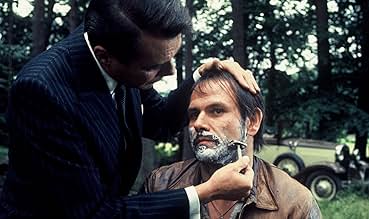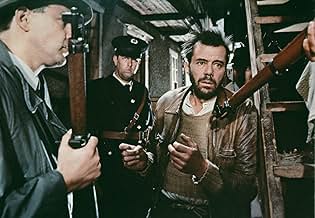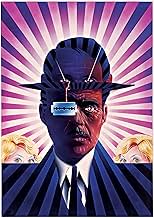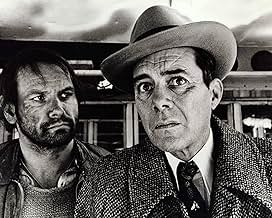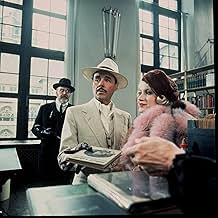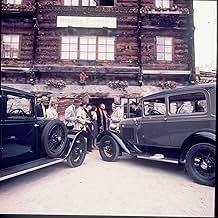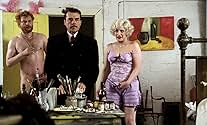Füge eine Handlung in deiner Sprache hinzuIn early-1930s Berlin, an elegant Russian émigré and eccentric chocolatier convinces himself that he has seen his doppelgänger, and hatches a murderous plan to trade his existence for an ent... Alles lesenIn early-1930s Berlin, an elegant Russian émigré and eccentric chocolatier convinces himself that he has seen his doppelgänger, and hatches a murderous plan to trade his existence for an entirely new one. Will he get over the deep despair?In early-1930s Berlin, an elegant Russian émigré and eccentric chocolatier convinces himself that he has seen his doppelgänger, and hatches a murderous plan to trade his existence for an entirely new one. Will he get over the deep despair?
- Regie
- Drehbuch
- Hauptbesetzung
- Auszeichnungen
- 3 Gewinne & 1 Nominierung insgesamt
- Innkeeper
- (Nicht genannt)
Empfohlene Bewertungen
I love the mystery of this film. It really is a puzzle of a film and sweeps us along on it's gorgeous journey. Twist follows turn and back again.
The whole cast are perfect with Dirk Bogarde being perfect as Hermann. The screenplay is brilliantly adopted from a Nabokov novel by Tom Stoppard with snappy and wicked dialogue that positively crackles.
The look of the film is muted and also beautiful because of it. It lends massively to why the film works so well as it's visually and uniformly a treat for the eyes. Enjoy the ride which will keep you guessing until the final frame.
Vladimir Nabokov wrote his novel "Despair" as a spoof of Dostoyevsky's "Crime and Punishment." The script includes lines referring to Dostoyevsky and Arthur Conan Doyle. "Despair" the film falls short of achieving/adapting the greatness of Dostoevsky or Conan Doyle. It is possibly because for Nabokov and Fassbinder the mental state of Herman (Bogarde) is paramount than the tale itself.
The audience struggles to come to terms with a clean shaven Herman suddenly sporting an elegant moustache in between sequences. If it was a fake moustache, the audience is not prepared for it by Fassbinder. Or were scenes edited out in the final cut?
Fassbinder was evidently quite familiar with Nabokov. Nabokov wrote Lolita with a lead character named Humbert Humbert. Fassbinder extrapolates the idea in "Despair" (or was it Stoppard?) by calling the lead character in "Despair" Herman Hermann, when Nabokov called him just Herman.
If there was one outstanding aspect in this film it was cinematographer Michael Ballhaus working with mirrors and glass panes in doors. One great shot, creditable to Fassbinder and Ballhaus, was of two Jews continuing to play chess at the street cafe as a Jewish shop is attacked by Nazis followed much later in the film by a distinctly similar shot of the same Jewish duo playing chess with non-distinctive clothes.
Another important aspect of the film is Fassbinder 's dedication of this quaint work to three mentally unstable geniuses: Antonin Artaud (the actor/playwright who introduced The Theatre of Cruelty) , Vincent Van Gogh (the painter who cut off his ear) and Unica Zurn (a painter famous for her paintings of torsos bound with string). And lastly several actors in this film and those supposed to play originally in the film were openly gay as was the director..
The film is set in the final years of the Weimar Republic...during the rise of the Nazis in the early 30s. Herman (Bogarde) is a Jewish Russian emigree who owns a successful candy company. However, he appears to be losing his mind through the course of the story and he has a strange obsession that a homeless man is his doppleganger....even though the man looks little like Herman. At first, Herman befriends the man and offers him a job...later you learn that Herman's kindness is a mask for his own sinister plans.
For me, watching this film was about as much fun at staring at the wall for 90 minutes. Slow and plodding beyond belief as well as nonsensical, I simply found watching this strange film to be nearly impossible the more I watched.
Wusstest du schon
- WissenswertesThis movie cost more than all of Director Rainer Werner Fassbinder's previous movies combined.
- PatzerThough the movie is set in Weimar Germany in the early 1930s, at 1:15:15, Hermann Hermann smokes a filtered cigarette, and those were put on the market in the 1950s.
- Zitate
Lydia: What's that accident all about?
Herman: What accident?
Lydia: In America. Why should it matter to you?
Herman: It doesn't say anything about an accident... it says just to go crash. Collapse!
Lydia: The whole street collapsed?
Herman: Wall Street.
Lydia: Were people killed?
Herman: Just a few. Mostly jumping out of windows. Nearly all of them were stock holders.
Lydia: Oh, Hermann...
Herman: Really, you are such a... such a stupid woman, Lydia. You've lived here for 7 years already and you still can't speak the language properly. Still, I don't mind. Inteligence would take the bloom off your carnality. No, a woman like you should keep moist and plump.
- VerbindungenFeatured in Dirk Bogarde: By Myself (1992)
Top-Auswahl
- How long is Despair?Powered by Alexa
Details
- Erscheinungsdatum
- Herkunftsländer
- Sprache
- Auch bekannt als
- Desesperación
- Drehorte
- Produktionsfirmen
- Weitere beteiligte Unternehmen bei IMDbPro anzeigen
Box Office
- Budget
- 6.000.000 DM (geschätzt)
- Bruttoertrag in den USA und Kanada
- 8.144 $
- Eröffnungswochenende in den USA und in Kanada
- 11.623 $
- 16. Feb. 2003
- Weltweiter Bruttoertrag
- 8.158 $
- Laufzeit1 Stunde 59 Minuten
- Sound-Mix
- Seitenverhältnis
- 1.66 : 1


